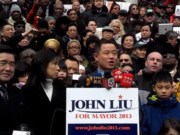MOSCOW — Six years into the presidency of Vladimir Putin, who will host President Bush and other leaders of the industrial world at a summit this weekend, political freedom is severely constrained in Russia.
While tolerating dissent in some pockets of society, the state is relentlessly tightening its control in parliament, political parties, regional governments, courts, activist organizations and the mass media.
* * *
Opposition parties sometimes find that the entire bureaucracy seems to be conspiring to block even their most basic operations.
– Peter Finn, “Putin Will Host G-8 In a Russia Under Ever Tighter Control,” The Washington Post, A1, July 13, 2006
PHOENIX — The Citizens Clean Elections Commission is going to have to decide what is a legitimate newspaper and what is not.
* * *
What [the commission’s executive director Todd] Lang and the commission conclude has implications far beyond the J & G Gun Sales catalog. That’s because an endorsement [of a candidate] by what the commission considers a newspaper or magazine does not trigger matching funds … [b]ut an identical plea in a private publication … effectively is a donation.
* * *
Potentially more serious would be that the Citizens Clean Elections Commission would have to determine what is a legitimate news publication … and what is not.
“My preliminary take is this is not a newspaper,” Lang said.
– Howard Fischer, “Gun Dealer’s Endorsement in Governor’s Race Stirs Questions”, www.azstarnet.com/metro/137398, July 11, 2006.
WASHINGTON — In letters to the full House and Senate, the Campaign Legal Center urged lawmakers to throw their support behind the Federal Election Administration Act of 2006 to replace the Federal Election Commission (FEC). The legislation would create a new and more effective regulatory agency with significant enforcement powers.
* * *
The Shays-Meehan bill proposes a new commission, the Federal Election Administration (FEA), which would consist of a Chairman and two other members. The Chairman, who would serve a ten-year term, would have managerial and administrative responsibilities. … In order to minimize partisanship within the FEA, the [other] two members of the FEA could not be from the same political party. The current FEC, consisting of [an even number of commissioners,] three Republicans and three Democrats, has been notoriously responsive to partisan interests[.]
– “Legal Center Presses for Support of FEC Replacement”, Campaign Legal Center, www.campaignlegalcenter.org/press-2115.html, July 12, 2006
SAN ANTONIO — [A] federal judge ruled Monday that members of Congress are — surprise — ordinary human beings who are subject to the same laws as other citizens of the United States.
* * *
But when the FBI executed a valid search warrant on the congressional office of Rep. William Jefferson of Louisiana in May, some members of Congress decided they were above the law.
* * *
After Jefferson ignored the subpoena to produce evidence for months, the [Executive’s] Justice Department obtained the warrant to search his office. A bipartisan group of lawmakers condemned the search as an unconscionable breach of the Constitution’s speech and debate clause, which is intended to protect lawmakers from political intimidation.
Chief U.S. District Judge Thomas Hogan … shot down that argument with classic understatement. “Legislators ought not stand above the law they create[.]”
– Editorial, “OUR TURN; Members of Congress are Ordinary People”, San Antonio Express-News, 6B, July 12, 2006.
LINCOLN — Only in a few states do voters pick among candidates for boards of public universities. Rarer still is a campaign finance dispute that leads to the impeachment and removal from office of such a board member. But that’s what happened on Friday, when the Nebraska Supreme Court found C. David Hergert guilty of charges on which the Nebraska Legislature had impeached him.
Nebraska’s unicameral legislature in April approved 10 articles of impeachment against Hergert, based on his successful 2004 campaign [against an 18-year incumbent] to become a regent. The crux of the impeachment charges — and the conviction by the Supreme Court — centers on [campaign] reporting requirements. Under Nebraska’s system of public financing of election campaigns, candidates must file reports when they reach certain spending thresholds — and reaching those milestones triggers payments from state funds to the candidate’s opponents. Hergert failed to file required reports and his failure to do so prevented his opponent from receiving campaign funds.
* * *
Gov. Dave Heineman will now appoint a new regent [now that the legislature has used campaign finance laws to remove the voters’ choice from office].
– Scott Jaschik, “Nebraska Regent Ousted”, Inside Higher Ed, http://www.insidehighered.com/news/2006/07/10/nebraska, July 10, 2006













